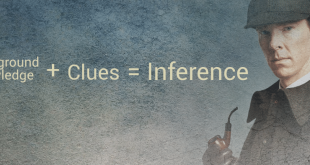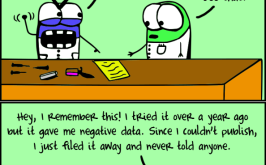Moving beyond induction and deduction .[embedded content] In a time when scientific relativism is expanding, it is important to keep up the claim for not reducing science to a pure discursive level. We have to maintain the Enlightenment tradition in which the main task of science is studying the structure of reality. Science is made possible by the fact that there are structures that are durable and independent of our knowledge or beliefs about them. There...
Read More »The man who stopped smoking and saved millions of lives
The man who stopped smoking and saved millions of lives .[embedded content]
Read More »Randomization — method or madness?
Randomization — method or madness? Bill Gates has recently been promoting chicken ownership to address poverty in Africa. In an open letter, Professor Blattman of University of Chicago pointed out that cash transfers may be more cost effective than chickens said: “It would be straightforward to run a study with a few thousand people in six countries, and eight or twelve variations, to understand which combination works best, where, and with whom. To me that...
Read More »Do RCTs really carry special epistemic weight?
Do RCTs really carry special epistemic weight? Mike Clarke, the Director of the Cochrane Centre in the UK, for example, states on the Centre’s Web site: ‘In a randomized trial, the only difference between the two groups being compared is that of most interest: the intervention under investigation’. This seems clearly to constitute a categorical assertion that by randomizing, all other factors — both known and unknown — are equalized between the experimental...
Read More »Taking the con out of RCTs
Taking the con out of RCTs Development actions and interventions (policies/programs/projects/practices) should be based on the evidence. This truism now comes with a radical proposal about the meaning of “the evidence.” In development practice, where there are hundreds of complex, sometimes rapidly changing, contexts seemingly innocuous phrases like “rely on the rigorous evidence” are taken to mean: “Ignore evidence from your context and rely in your...
Read More »Bradford Hill — comment trouver de la causalité dans des corrélations
Bradford Hill — comment trouver de la causalité dans des corrélations .[embedded content]
Read More »How to achieve ‘external validity’
How to achieve ‘external validity’ There is a lot of discussion in the literature on beginning with experiments and then going on to check “external validity”. But to imagine that there is a scientific way to achieve external validity is, for the most part, a delusion … RCTs do not in themselves tell us anything about the traits of populations in other places and at other times. Hence, no matter how large the population from which we draw our random samples...
Read More »Orbáns Ungarn: die Wut der Europäer kommt zu spät
Orbáns Ungarn: die Wut der Europäer kommt zu spät Na endlich! Alle die seit Jahren meinen, die EU müsse dem “kleinen Diktator” Viktor Orban die rote Karte zeigen, kamen am Donnerstag auf ihre Kosten. Es war wie auf dem Schulhof, wo sich nach Jahren der Nichteinmischung die Mehrheit endlich den herrschenden Rowdy vornimmt und ihn nach allen Regeln der Kunst zerlegt … Bloß wo waren sie denn früher? Etwa Mark Rutte mit seinem starken Spruch, dass so ein Land...
Read More »Stefan Löfven borde veta hut
Stefan Löfven borde veta hut På gårdagens presskonferens — då vår statsminister meddelade sin avgång — upprepade Stefan Löfven flera gånger att det var Vänsterpartiets fel att han tvingats till detta, trots att Socialdemokraterna enligt Löfven gått Vänsterpartiet till mötes (oh ja och på julafton kommer tomten) när det gällde konflikten kring marknadshyror. Och detta ankors plask och grodors plums tror Löfven att han kan lura i oss. Man tar sig för pannan!...
Read More »Randomizations creating illusions of knowledge
Randomizations creating illusions of knowledge The advantage of randomised experiments in describing populations creates an illusion of knowledge … This happens because of the propensity of scientific journals to value so-called causal findings and not to value findings where no (so-called) causality is found. In brief, it is arguable that we know less than we think we do. To see this, suppose—as is indeed the case in reality—that thousands of researchers...
Read More » Lars P. Syll
Lars P. Syll








